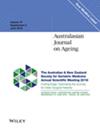Effectiveness of technological interventions on psychosocial well-being and perception of technological interventions among people with Parkinson's disease: A systematic review
Abstract
Objectives
The increasing number of technological interventions related to Parkinson's disease (PD) signifies growing research interest in the PD technological domain. It remains unknown how these interventions could affect the psychosocial health of people with PD. This systematic review aims to explore how technological interventions affect people with PD psychosocial well-being and their perception towards these interventions.
Method
A systematic review was conducted using Cochrane Library®, Embase®, IEEE Xplore Digital Library®, PsycInfo®, PubMed® and Web of Science® databases following PRISMA guidelines. Two individual assessors conducted quality appraisals using the Mixed Method Appraisal Tool. Both quantitative narrative and qualitative thematic synthesis were adopted to analyse the extracted data.
Results
This review included 27 articles with 752 people with PD, with seven categories of technologies implemented in physical rehabilitation. Qualitative findings indicated the overarching theme of coping with technological intervention. Three themes were identified: user perception of intervention design and functional appropriateness, attitude shift and coping, and perceived benefits from technological interventions. Unsuccessful coping attempts and overcomplicated intervention designs induced negative emotions and affected the psychosocial well-being of people with PD.
Conclusions
Although most PD technological interventions focused on physical rehabilitation, people with PD reported a psychosocial gain in improved autonomy and reinforced social relationships during the intervention period. A better rewardability intervention design was considered more satisfying and could promote self-acceptance rather than stress-inducing. Interventions' technological complexity should match participants' expectations and technological literacy to facilitate the coping process with the intervention for people with PD. More research would be required to quantify the reported psychosocial gain and examine the technological literacy of people with PD when designing a more appropriate intervention regime.


 求助内容:
求助内容: 应助结果提醒方式:
应助结果提醒方式:


